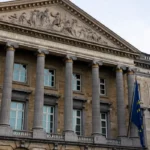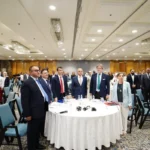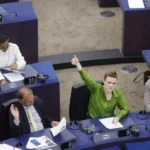The Hamas attack on October 7, 2023, represents a turning point in the history of the Israeli-Palestinian conflict, and a real setback for Israel. Immediately, the European Union – and the United States – aligned themselves with the Israeli approach and endorsed the fact that this attack was akin to “Israeli September 11.”
But this unconditional and unanimous solidarity displayed in reaction to the “Israeli shock” is beginning to crumble, because certain European countries are contesting a rather partial and unbalanced position. Moreover, the protest movements in Europe and the support shown by millions of Europeans, from Switzerland to Italy, have highlighted a major contrast between citizens and their leaders.
European compassion towards Israel was demonstrated by the visits of several European leaders to Tel Aviv, as well as that of the President of the European Commission, Ursula von der Leyen, who displayed unwavering support for Israel and supported “the right to defend oneself” of the Israelis, but did not condition this support on respect for international law, nor took the time to visit the Palestinian territories.
A positioning that goes against EU policy on the subject. Indeed, these positions are considered by several European diplomats as “a break with the principles and values of the EU and its recognized role as mediator”.
With the conflagration in the Middle East, Europe must now face two wars: Ukraine and Gaza. In both cases, there is a potential divisive effect among EU members.
In the Ukrainian case, the EU will continue to show solidarity with its first line of defense. But in the Israeli-Palestinian conflict, and despite the common geostrategic interest, a disagreement has arisen between European countries regarding the protection of Palestinian civilians and political perspectives.
At the European Summit in Brussels (October 25-26), European leaders reached a minimum agreement on the Gaza war by simply calling for “humanitarian corridors and intermittent truces” to provide relief. aid to the inhabitants of the besieged Gaza Strip.
They also supported the upcoming holding of an “international peace conference” to discuss the two-state solution, after six months, based on the initiative of Spain, which currently presides over the EU.
Some observers wonder whether the twenty-seven countries are debating the difference between a “ceasefire” or “humanitarian corridors”, or between a “continuous humanitarian truce” and “intermittent humanitarian truces”…
The answer is that the disagreement is deeply political, and that three camps oppose each other
- the camp that supports Israel and rejects the call for a ceasefire and even a humanitarian truce so that Israel can “defend itself”: Germany, Austria and Hungary
- the camp which demands not to adopt a policy of “double standards” and to pay attention to the tragic situation in Gaza: Spain, Ireland and Portugal
- the camp which seeks to smooth out the angles, which contributes to marginalizing the EU and depriving it of an acceptable diplomatic role in its geopolitical neighborhood: France is the leader
However, Brussels “has always argued for a two-state solution”, underlined to franceinfo, Hugh Lovatt, specialist in the Israeli-Palestinian conflict and analyst at the European Council on International Relations.
This solution has always posed a problem for the 27 who “have always had difficulty carrying out” this proposal, in particular due to a lack of consensus. Result, if “the EU has done nothing, it has never had very significant political weight on this issue, unlike the United States”, explains the expert.
James Moran, researcher at the Center for European Policy Study, and former advisor to European diplomacy, explained to franceinfo that the involvement of Europeans in this conflict is above all “financial”.
“The Union and its member states have become, over time, the primary financial support of the Palestinian Authority,” which administers the West Bank, the specialist said. Hamas, in power in the Gaza Strip and which the EU classifies as a terrorist organization, does not receive money from European institutions. But “the bloc is a major player in humanitarian and development aid” in the Palestinian enclave, said James Moran.
This article is originally published on temoignages.re






